Docherty bids adieu to pro career
Some athletic heroes like NFL greats Jim Brown and Barry Sanders leave their fans clamoring for more and retire with undiminished powers. Some athletes like baseball’s Willie Mays and even The Greatest, boxer Muhammad Ali, leave their fans with the sense that they overstayed their welcome in the limelight. And some, like triathlon’s Bevan Docherty, chart a path between those extremes and do it just right.
New Zealand’s Docherty captured almost all the honors a triathlete could dream of. With silver at Athens and bronze in Beijing, he is the only competitor to capture medals in consecutive Olympic triathlons. With gold at Madeira and silver in Vancouver, he won two ITU World Championship medals. At Melbourne, he won Commonwealth Games silver. In 2007 and 2008, he won big checks for runner-up finishes at Hy-Vee. And in a path seemingly destined for late career long course glory, he took a bronze at the 2012 Ironman 70.3 World Championship and set a race record in his home country Ironman debut at Taupo in 2013.
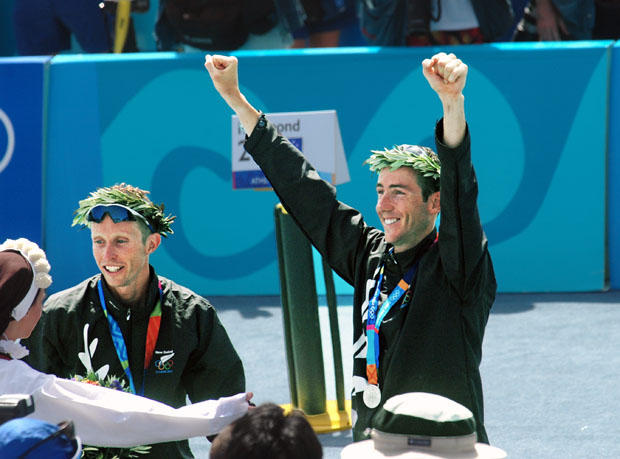
Seemingly indestructible for nearly two decades, Docherty started to fall prey to the inevitable as he turned 37 in 2014 and lost his immunity to injuries. While he felt he had more wins in the tank, he was not meeting his own high standards. “With injuries outweighing winning results in the last season, it seems like a great time to listen to this tired old body and bow out gracefully,” he wrote on his blog. On January 7, he announced his retirement and said it was time to spend more time with his wife and children – and see if he might find a new career as a pilot – or something which could bring him another type of joy and would satisfy his innate quest for perfection.
Slowtwitch: How did you feel about winning the 2004 ITU World title in Madeira, Portugal? You had gradual success since 2000 and won a few World Cup podiums – but this was another level.
Bevan Docherty: Obviously I was pretty excited and over the moon. It gave me a lot of confidence with the Olympics coming up.
ST: How confident were you going into Madeira?
Bevan: I was pretty confident. I think I went through the first 3k of the run in 8:45 or 8:50. That pretty much whittled the field down to myself, [1999 ITU World champion] Dmitry Gaag and Ivan Raña.
ST: What was the defining moment in that race?
Bevan: About 7k into the run, Raña put in a big surge which dropped Gaag. I just hung in for dear life until Raña got it in his head that he wasn't going to drop me and we ran together until the final sprint. I was not so confident in my sprint at that time – I hadn’t been put in that situation. So Raña took off initially and I started sprinting as well. To my surprise, right after he made the surge, he started coming back to me and I got him at the line.
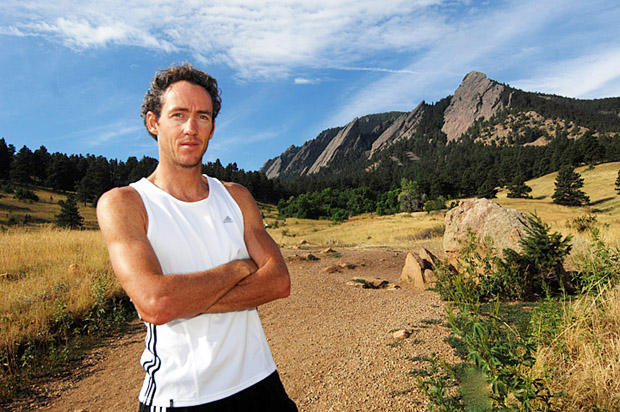
ST: Tell us how you and Hamish Carter prepared for the steep hill on the Athens bike course?
Bevan: I was always a good climber so as soon as they announced the course in Athens I was super excited. At first Hamish was off doing his thing and I was off doing my thing. I was based in Victoria, Canada training with Kris Gemmell during most of the buildup and we certainly found some good hills to simulate the Athens climb. But the final months I was preparing with the New Zealand team just outside of Pau in France and we had a great training camp there. I did a bit of training with Hamish, but our key sets were done separately. It was very low key, just a relaxed atmosphere that made it easy to do our work. It showed obviously in the race results.
ST: How inspired were you by New Zealand cyclist Sarah Ulmer’s 3k pursuit gold medal early in the Olympics – and watching some members of the New Zealand Olympic team do the haka [ceremonial Maori war dance] to celebrate her win?
Bevan: Watching it with my coach [Mark Elliott] I said I’d really like to experience that myself. But I don't think it had anything to do with my performance.
ST: Did you take it as a compliment or a criticism when Kris Gemmell said of you: “Bevan is a very confident person and selfish by nature, which is why he’s such a great athlete.”
Bevan: Looking back, I can see that selfishness is necessary to be the best in the world at your sport. And now, with our kids growing up, that is why I feel I could no longer continue to be as selfish as I needed to be to achieve the goals I set for myself at the beginning of my career.
ST: How did you react when some people said you were the favorite going into the Athens Olympic men’s race?
Bevan: I was just excited to be the favorite and it boosted my confidence. I looked at it that everyone was fearful of me and it was my sort of course.
ST: Were you nervous about coming out of the swim in 17th position?
Bevan: No. I was happy where I was. Andy Potts was well ahead but Hamish and I were in the main pack and knew that's where we needed to be.
ST: What was your strategy on the bike?
Bevan: Hamish and I were in a group of 7 or 8 who got away on the bike. We were good enough and lucky enough to be part of that group. It was perfect for us. As soon as we got on the run, Hamish, Sven Riederer and I broke away so we were battling for the medals.
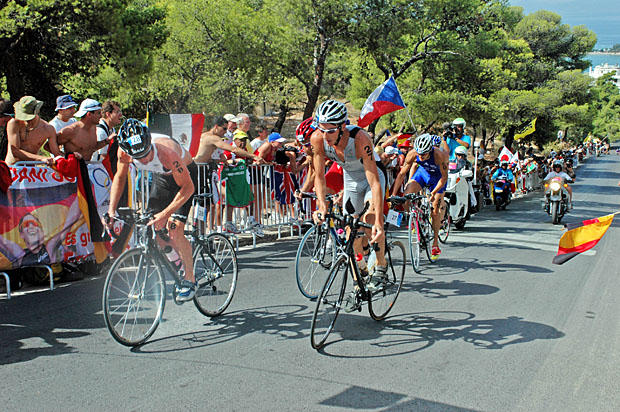
ST: How did your goals for the day affect your decision how hard to push the bike? Were you and Hamish encouraging one another to keep the gas on?
Bevan: Going in, my goal was to make sure I got a medal. So I felt it was very important to maintain the break and not let the riders behind get back in the hunt. As a result, I probably worked harder than most in our pack. If my goal was to win the gold, I might have had different tactics.
ST: What were the energy levels of the pack nearing the end of the bike? Why didn’t you and Hamish attack and leave the rest to take advantage of their flagging energy?
Bevan: Some of the riders seemed to be losing energy. But it didn’t make sense to expend the energy to make a surge because we believed we were the stronger runners.
ST: How did you feel on the first part of the run when Hamish started off strong?
Bevan: Right after the bike, I was really struggling and I just tried to hang on. You just have to dig deep and try to ignore the pain. Pretty soon it was just the three of us and I settled in.
ST: When did you start to regain your strength on the run?
Bevan: About halfway into the run, I started to get my legs back and I was able to race again as opposed to just hanging on.
ST: With Greg Bennett looming in 4th, what was your strategy in the last 5km?
Bevan: I was very aware that Greg was a very good runner and was making up some time. I didn’t want the three of us to get into a cat and mouse game and let him back into it so I stayed on the gas.
ST: When did you make the first surge on the last lap of the run?
Bevan: I think I made that surge with 1200 to 1500 meters to go. The goal was to drop Sven and it worked. It was important because although I was confident Hamish and I could outrun Sven, he was a tenacious competitor, a first rate athlete, and might be a problem if we let it go to the end.
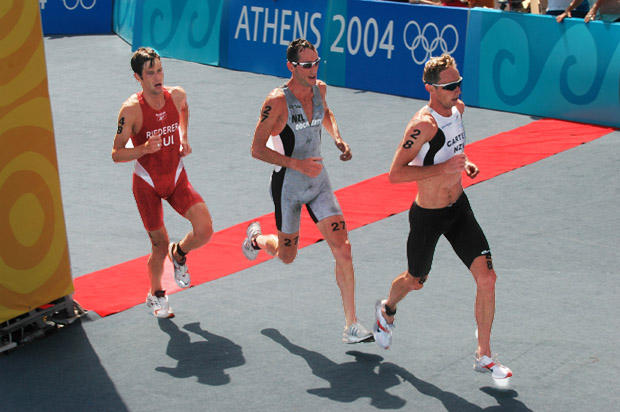
ST: Hamish says that after you two dropped Riederer, you said to him: “Hey, we've dropped the Swiss guy and we are going to get a medal” Hamish said, “It cracked me up. I was thinking, 'I wouldn't be talking because, when you talk, you lose a breath and more than likely your body is going to flood with lactic acid.'”
Bevan: From my perspective, I don't think that was true. At the World Championship in Madeira, when it came down to the final yards, I told Ivan Raña ‘Good luck,’ and I won the sprint. I think you are so full of adrenaline that you are not affected and do not notice any effect from speaking a few words.
ST: When did Hamish make his final move?
Bevan: Not exactly sure but it might have been with about 400 meters to go when he started to pull away and I couldn’t answer.
ST: What did it mean that you lost at Athens the most memorable race in your career?
Bevan: In my opinion, I didn’t lose. I won silver. My whole goal was to win an Olympic medal and I was pretty happy about that.
ST: What do you remember at the finish?
Bevan: Jumping the fence to see my Mum and Dad and my sister [Fiona] after crossing the line at Athens was a priceless moment. They have always been my biggest fans.
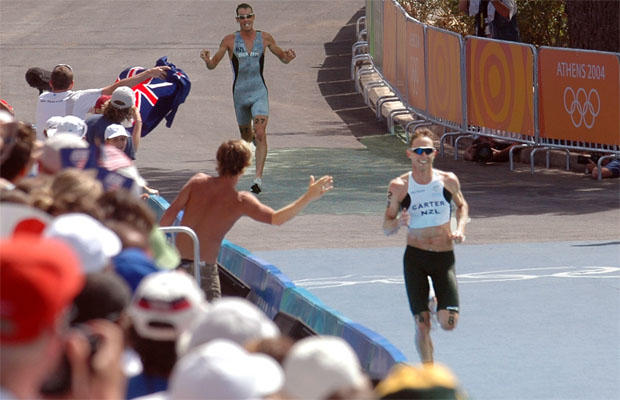
ST: How was it a life changer to be part of New Zealand Olympic history with your 1-2 finish? That was only the second time in New Zealand Olympic history – Kiwi equestrian riders Blyth Tait and Sally Clark took gold and silver in the three-day event in 1996.
Bevan: There was a lot good and some bad. After the Olympics I was able to get more sponsorship and got invitations to speak and appear at things which promoted the sport in New Zealand. On the other hand, I had less time to train and focus on my race fitness.
ST: Beijing was one of greatest races in triathlon history, a 5-man duel that gradually stripped down one man at a time. Take us through that run.
Bevan: I was backing myself for the sprint finish at that race. But I think the deciding moment was little earlier on the run. [Alistair Brownlee took the lead early but fell back to 12th]. Raña [who finished 5th] made a move around the 5k mark. The pace that he set at that point was too much for Whitfield at the time and he fell off the pace. I probably used a bit more than an ideal amount of energy to close the gap on Raña right away, and Frodeno and Gomez came with me.
ST: Take us through the last half lap.
Bevan: Coming to the final stretch, the three leaders were myself, Frodeno and Gomez. We were playing a cat and mouse came. At that point the pace dropped and that allowed Simon to catch up to us. I was still backing myself for the sprint. But coming into the final straight there was still a long way to the finish. After he surged back to us, Simon gathered himself for a bit, and then took off at a pace that would later say to me he could no longer hold. He called it shock and awe. Basically a pace to try to crack all of us. Yeah, he cracked me. I had nothing in my legs at that point.
ST: You had a front row seat for the gold-silver clash?
Bevan: Frodo was the only one who could stay with Simon. Unfortunately for Simon, Frodo did stay with him and then basically rolled him.
ST: Any second thoughts?
Bevan: I feel I played my cards earlier on in the game and maybe could have raced it better tactically. My goal going into that race was to win Olympic gold, whereas at Athens my goal was to win an Olympic medal. In Beijing I was a little disappointed. But whether I got bronze or silver in that race in my opinion was the exact same. Olympic gold was what I was after. That said, I was still very happy to back it up with a medal. I was [and still is] the only person to win back-to-back Olympic triathlon medals.
ST: Were you more upset at losing gold or relieved you won a medal?
Bevan: It was huge relief. Anybody who has been through all that and has been in my position knows the difference between winning a medal and simply going to the Olympics and not winning a medal is huge. So I was happy.
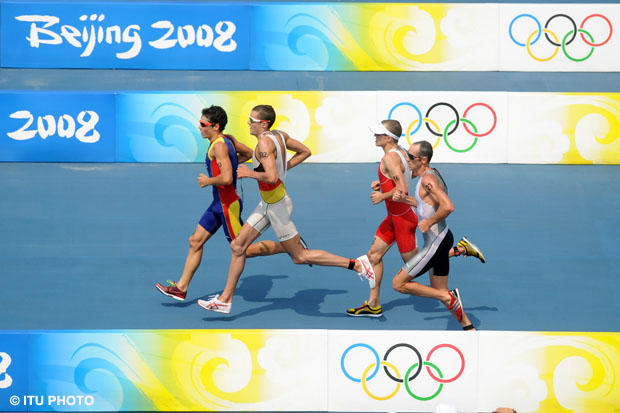
ST: You had some excellent runner-up finishes – Commonwealth Games in 2006, Hy-Vee in 2007 and 2008 and the ITU World Championship in Vancouver in 2008. What was your most satisfying second place finish?
Bevan: Commonwealth Games in 2006 is the one that stands above. The Hy-Vee races in 2007 and 2008 were a little bit frustrating – and not close. ITU Worlds in 2008 I had a good race, but Javier [Gomez] was so far in front. I had second wrapped up and I didn’t push myself to the limit as I did in Commonwealth.
ST: Tell us about the 2006 Commonwealth Games.
Bevan: Brad Kahlefeldt was off the front. My duel was with Peter Robertson for silver and bronze.
ST: Robertson is a fierce opponent and had won three gold and two silvers at the ITU World Championship between 2000 and 2005.
Bevan: That is one of the greatest duels I have had – albeit we were racing for second. But it was real entertaining. It was back and forth for a bit. Around 3k. Robbo surged and I reined him back. Robbo surged again and I came over top of him. Finally with maybe 400 meters to go, I rolled over top of him for good. That was a great battle.
ST: The 2013 Ironman 70.3 World Champs at Lake Las Vegas was right after your disappointing 12th place finish in your final Olympics. Were you surprised to be dueling with Craig Alexander for second place?
Bevan: I was obviously carrying a lot of fitness leading into that race after the Olympic buildup. And it was the result I was expecting to be honest – although I hadn’t spent much time on a TT bike. My race tactics for that event were terrible. Sebastian Kienle was off the front, but about 3 or 4k into the run, I felt like a million dollars and proceeded to just take off from Craig Alexander and Tim O’Donnell. It was almost Olympic distance pace. Then, about 4k later, I hit the wall and Craig caught me up pretty quickly. I tried to hang on a long as possible. Fortunately I was fit enough to hang on for 3rd. I definitely could have raced a little bit smarter and been a little more patient.
ST: Did you learn to be patient in long course races later in your career?
Bevan: I think I learned pretty early on – in my first Ironman in New Zealand in 2013 – to be patient and to race a little bit smarter.
ST: What was your most exciting come-from-behind sprint finish – New Plymouth in 2005 or the one-second win over Raña at Madeira at the 2004 ITU Worlds?
Bevan: As far as finishes go, I think it is the one at New Plymouth. It is on You Tube. It was tactically very smart. I was patient until the end and went at the right time. To win the New Zealand World Cup was pretty cool.
ST: How far back were you?
Bevan: Kris Gemmell made his move with about 600 meters to go and opened up a 30 meter lead and I came back and passed him at the beginning of the blue carpet. Kris Gemmell was my good friend and a renowned sprinter and it was a fun to be part of. .
ST: In the rush of the sprint, what are your impressions?
Bevan: Essentially you are in a bit of a dream. You don’t feel the pain any more. I guess you go a little bit numb. I guess the key for something like that is to try and focus on your stride and maintain your form. Because you’ve been racing for over an hour and a half, you try to keep on making your legs go as fast as possible. Sometimes you throw form out the door which can be the difference between winning and losing.
ST: In your first Ironman at New Zealand in 2013, you set a race record [8:15:35] and beat all of Cam Brown’s 10 win times. You also had a strong win at Ironman Texas last year [8:09:37]. Both races showed you belonged among the top contenders at the biggest Ironman events. In middle of that, you ran into digestive troubles at Kona in 2013. Ever figure out what caused that?
Bevan: I figured the issue was I over-analyzed my nutrition. You come into the sport and people say Ironman nutrition is important and I listened and was determined to stay on top of it. But I just kept putting too much down. After so many hours of doing that, your body starts rejecting it. So I made some simple adjustments kept it relatively even. But unfortunately it took a few Ironman races to figure it out. In fact, it first happened in the Taupo Ironman where I ended up making the race record. Fortunately in that race it happened about the 30k mark, and I had a 15 minute lead. So I had time to readjust and I even walked for about a k. But it continued to be a frustrating problem. I was in good shape for various races but couldn’t hold it down.
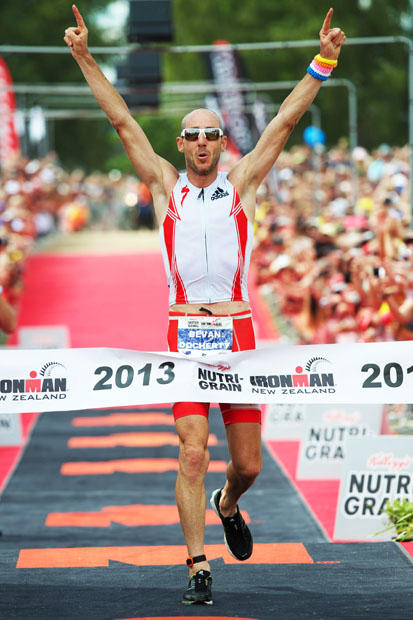
ST: Your win at Ironman Texas in 2014 must have been encouraging after your nutrition troubles at Ironman Hawaii in 2013?
Bevan: My races at Ironman New Zealand and Texas were very different. My first Ironman I was super fit. I was almost peaking for it. Whereas at Ironman Texas, with that field, no disrespect intended, I was not at peak form. I just had to be smart and play the game and pace myself. And that is what I did.
ST: Ironman Hawaii is so important and is so hard to be one of the top 3 guys who are on that day. Is that all-or-nothing aspect of the Ironman season really discouraging?
Bevan: Hawaii was a tough one for me. It was probably the biggest regret of my career. I think I may have left it too late. Maybe I should have taken it on after the Beijing Olympics. My big issue with Kona in 2013 and 2014 was just that my age was counting against me.
ST: Is betting the whole season on one big race tough for a career?
Bevan: In my opinion, there is no trouble focusing for one particular event. I was able to do that relatively easily throughout my career. I think if you are a good enough athlete and well prepared and smart enough you are able to perform well at that event and have a relatively good season. You just have to be smart. Unfortunately for me, my two attempts at Kona were plagued with injury and stomach issues. It is something that will bother me over the years. But I just have to be happy with my career and ready to move on.
ST: Your record is one of the greatest in the history of the sport. But have your high standards and the few disappointments – no gold at the Olympics and not a good performance at Kona – been tough to live with?
Bevan: I think a lot of top athletes would agree with me, regardless whether you achieve something or not, there is always something beyond what you have done. Even if I achieved so many more goals, it is very hard to walk away satisfied. I have other things I want to do in life. I want to spend more time with my family. So it sucks that I wasn’t able to give that Hawaiian Ironman a good crack. But I am happy to move on.
ST: What were your ills and injuries the last 2 years of competition?
Bevan: Through most of my career, I never really had any injuries. My next-to-last season, I had stomach issues – not an illness or an injury, just me doing silly things with my nutrition. But it wasn’t until my final year that I had injuries to battle back from. I had a stress fracture in my navicular bone in my foot. I tried to rehab through that and put myself in good shape for the Ironman in Kona. But other things happened in 2014 as well. My Achilles was flaring up and I was constantly having to deal with that. It was very tough for someone had been injury-free for many years to be fighting a whole bunch of injuries. I could tell my body was starting to shut down. Getting in shape for peak performance was getting increasingly difficult over the last years. I was talking with Greg Bennett the other day. We both have been in the sport a long time. And he has been in a helluva lot longer than me. But we all know it gets harder and harder get in that shape. Back in the day it was very easy to get in top shape and you could hold it for a couple of months at a time. Nowadays it seems like we are only able to hold top form for a couple of weeks. That was another reason for calling it a day. The opportunity to win big races was getting smaller and smaller. I still believe I've got some great races in me but it’s harder to get into that shape.
ST: The cost-benefit ratio started to reverse as you evolved from bulletproof youth to an older athlete?
Bevan: Some athletes are happy just staying in the sport enjoying the travel and competition. I was in the sport to achieve the goals I have set. When I could see it was getting harder and harder to achieve those goals, I decided to call it quits.
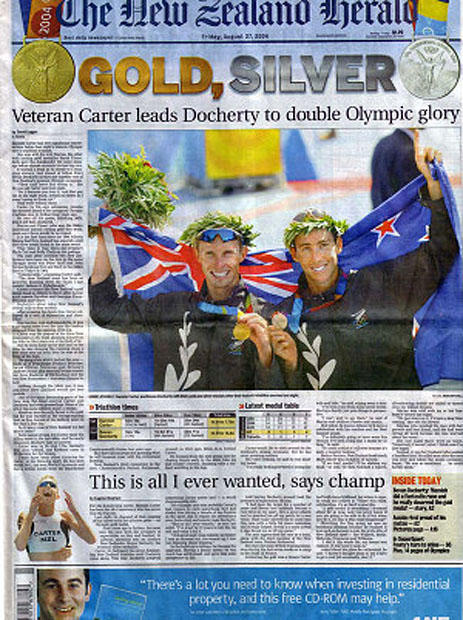
ST: How would you like to be remembered for your triathlon career?
Bevan: I’ve been receiving words of support from all over the last few days. One standout theme in all these tweets and emails and stuff had been my gutsiness and my tough attitude towards racing and training, That’s something I'm proud of and happy to be known as one of the toughest hardest competitors out there. I was never the most naturally gifted athlete. I was certainly an athlete who had a very good and tough work ethic and one of the hardest mentalities out there. That is something I am proud of – and I’m happy that people have seen that.
ST: What are you most looking forward to in your family life?
Bevan: Basically having the energy to do stuff with my kids. Over Christmas we were able to go up to Tahoe and play in the snow. Certainly being a triathlete I was used to summer sport and hadn’t been in much snow recently. Also, being able to enjoy Christmas was awesome instead of having that little devil on your shoulder saying you should be out training and shouldn’t be enjoying too many drinks. It’s been great just to relax and enjoy time and not feeling pressured to go out and train.
ST: Why did you take up flying?
Bevan: It's not my number one passion, but it's something I’ve always wanted to do and I've been doing a bit of flying in my time off the last few years. I was able to get my private pilot’s license recently. I am not 100 percent sure I want to pursue a career in flying. But I will always try to be the best in whatever I do. I will just continue. Who knows? I will keep working to get my commercial license.
ST: Looking back what was the most lasting and satisfying aspect of your triathlon career?
Bevan: That is a tough one. At the end on the day, I've got my Olympic medals hanging up in the corner of a room. That is about all I have to show about my triathlon career. They are surrounded by kids’ toys and kids’ posters. It was great to win those. But I put family well above those medals. In terms of the lasting things of triathlon, it is definitely the friends and people I've met over the years.
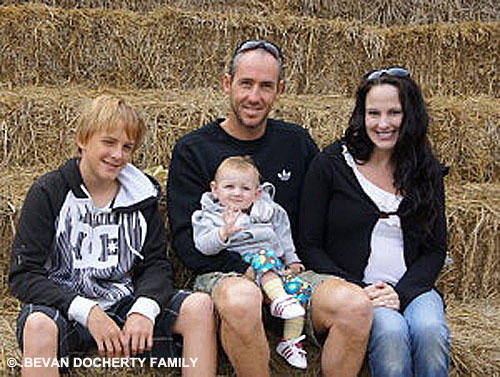


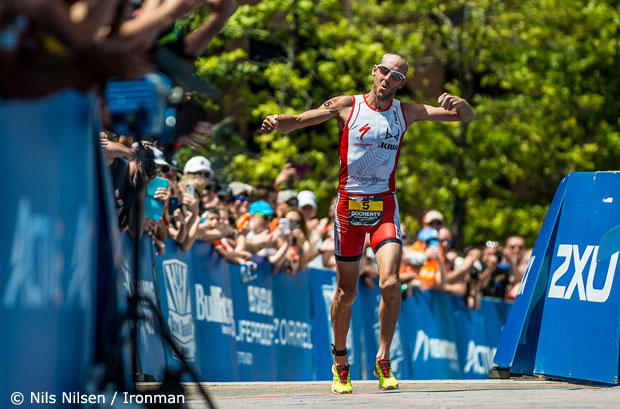
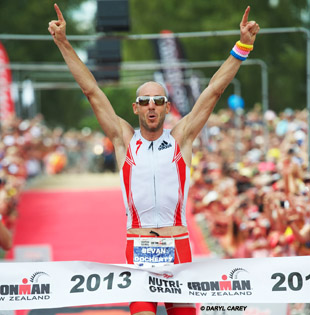
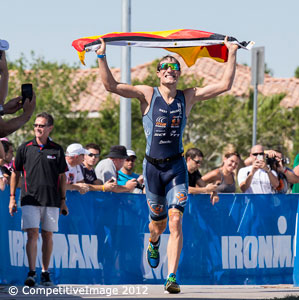
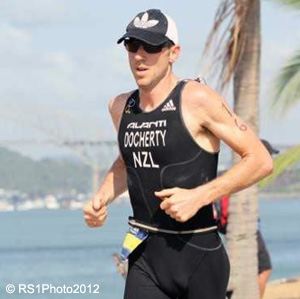
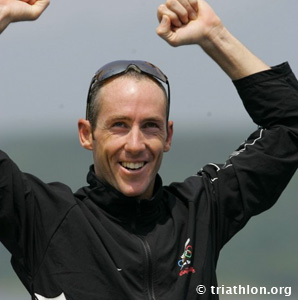
Start the discussion at slowtwitch.northend.network